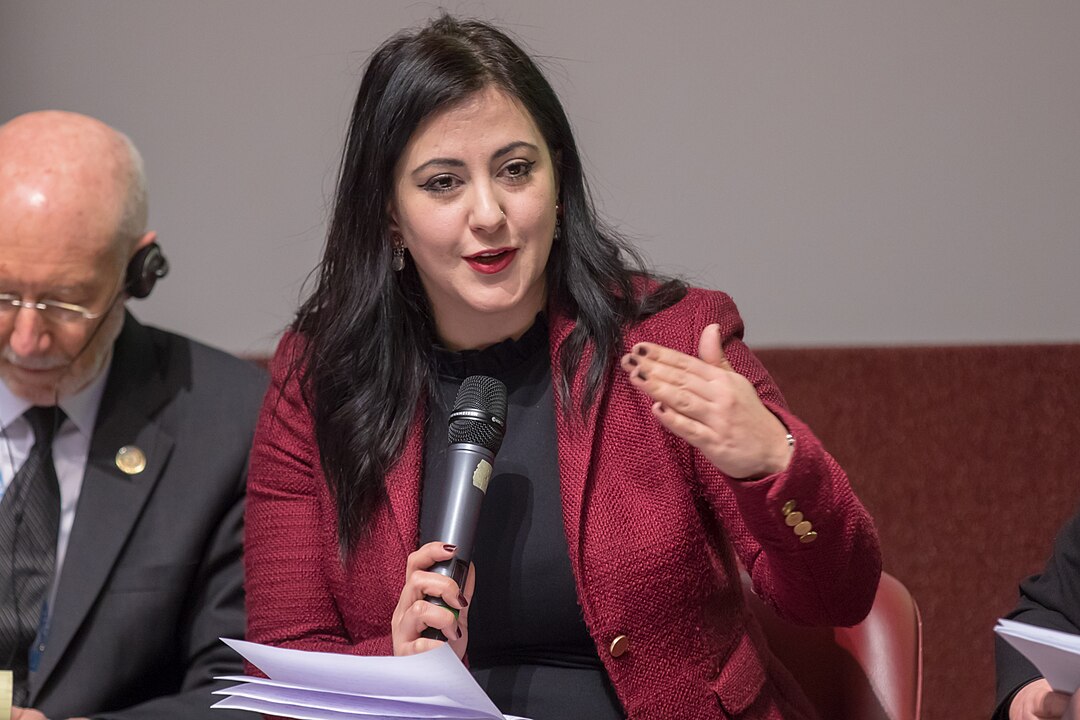
Hiba Qasas speaking at the Moderated High-Level Policy Session 14: Knowledge societies, capacity building and e-learning, WSIS 2018. ITU Pictures, from Geneva, Switzerland / Wikimedia Commons, CC BY 2.0.
A Palestinian “Peacebuilder”
Camille Delattre is a student in the Peace, Humanitarian Action and Development Masters program at Sciences Po Lille, specializing in the study of conflict management and development issues.
Hiba Qasas was born in 1980, in Nablus in the West Bank. In 2001, she obtained a master’s degree in International Cooperation for Development at the University of Pavia in Italy. One year later, she committed as a member of a Palestinian NGO with a focus on micro finance and rural development, before becoming a member of the United Nations Development Programme (UNDP) in Palestine, managing a broad range of programmes in the areas of poverty reduction, education, crisis prevention and recovery, and peacebuilding. In 2011, Hiba Qasas became the Head of the Middle East and North Africa (MENA) Section at the United Nations (UN) headquarters in New York, and an UN Women Country Representative in Iraq from 2015. Finally, in 2020, she managed to become the Chief of the Crisis Prevention and Response Office in Genova and the Head of the Secretariat of the Principles for Peace Initiative at the Interpeace organization (International Organization for Peacebuilding).
Commitment and work in multilateral affairs
Hiba Qasas is presented by the Peace Talks initiative as a “peacebuilder” and a “changemaker”. Her youth in Palestine was marked by imposed curfews. By referring to this past, she considers herself as part of the “two billion people around the world whose life, reality and future [were] shaped by conflicts”.
She has more than 17 years of experience in international development, crisis prevention and humanitarian assistance. Her work mainly focuses on crisis countries of the MENA region and on gender issues.
At the present time, she is involved in a collective effort to rethink the set of principles and guidance norms of peace processes. She affirms that the “era of comprehensive peace agreements (1975-2011)” where parties in conflict find an agreement through international mediation is outdated. According to her, 11 cases of comprehensive deals have failed since the Cold War. In Bosnia, Burundi, DRC (Democratic Republic of Congo), Somalia, or Sudan, a comprehensive deal had to be reviewed “because violence re-ignited or because key groups had not been included in the original agreement”. Therefore, she criticizes the model of peacebuilding based on off-the-shelf solutions and calls for a new frame of reference for peace processes. In a speech delivered at the Peace Talks seminar of 2021, she asserts: “We believe that peace is more than political peace. We believe that peace is more than the absence of violence and we believe it’s rooted both in social foundations and national responsibility”.
Hiba Qasas identifies three key objectives to assure more effectiveness in peace processes:
Creation of a frame of reference, a common grammar in terms of peace
She is part of a movement that collaboratively develops and establishes a new set of principles, informal norms, and guidance in order to build more inclusive peace processes. In this sense, women’s inclusion is seen as an asset. When she worked at the UN Women in Syria she stated: “UN Women has been advocating with the women of Syria for their rightful role as voices of peace, building their leadership capacities, convening women from diverse backgrounds and opinions, and supporting them in the process of identifying and unifying around a common agenda for peace.”
Greater accountability and oversight
Hiba stands for the promotion of accountability and long-term oversight of peace processes that would lead to better implementation actions. The idea is to promote a global participatory initiative through the amplification of local voices and the integration of local perspectives and aspirations in the center of “the global debate”. This effort would integrate the culture, the history and the underlying grieve that exist in each concerned society.
New incentives
She calls for the transformations of the incitements that drive and govern national and international actors engaged in peacebuilding. According to Hiba, these interventions are too focused on conflict resolution rather than sustainable peace. Instead of looking at the causes of war, she proposes a strategy based on the exploration of the attitudes, institutions and structures that build a more peaceful society.
Camille Delattre , "Hiba Qasas. A Palestinian “Peacebuilder”". Portrait [en ligne], 04.07.2023, https://observatoire-multilateralisme.fr/publications/hiba-qasas/
